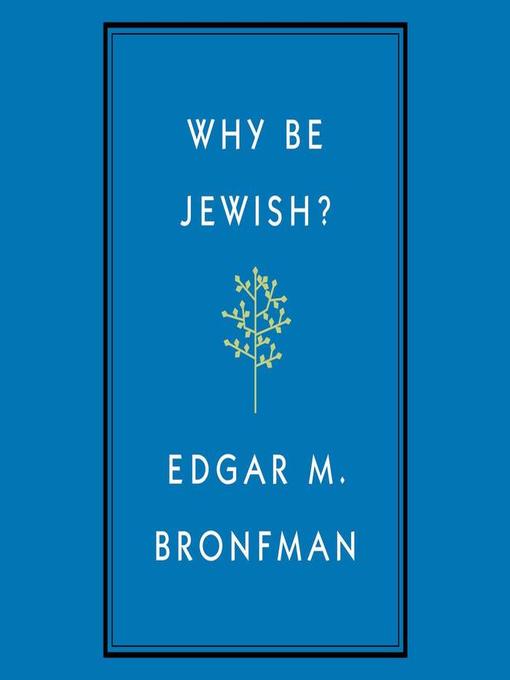
Why Be Jewish?
A Testament
- اطلاعات
- نقد و بررسی
- دیدگاه کاربران
نقد و بررسی

January 11, 2016
The late Bronfman’s (1929–2013) last work effectively conveys “the deep and absorbing love” for Judaism that he found late in life. The book more than meets his stated goal of creating an accessible introduction for secular Jews seeking ways of finding meaning in their heritage without having to believe in God. He does so through a “distillation of the elements of Judaism” he most values, such as asking questions, performing acts of social justice, and engagement with Jewish texts, philosophy, history, and art. Little here will be new for readers who are already familiar with the Jewish Bible and ritual observance. His section on questioning authority, for example, makes much use of Moses and Job. Not all sections work equally well; transforming the escalation of the 10 plagues in Egypt into a business lesson to “be relentless” will strike some as a stretch. Bronfman also offers personal prescriptions by injecting anecdotes from his youth and taking pride in the legacy of his training program for young Jewish leaders; it has led to some remarkable initiatives, exemplifying the principles he emphasizes. This is a fantastic rumination on the principles and practices of Judaism for anyone interested in Jewish faith and culture.

December 1, 2015
The late businessman and philanthropist answers his title's question with a last testament of sorts. In the ancient Jewish tradition of an ethical will that dispenses not tangibles but moral principles, Bronfman (The Bronfman Haggadah, 2013, etc.) completed his manuscript just weeks before his death. Describing himself as a secular Jew--not a believer in a singular anthropomorphic authority whose avocation is to check on individual mortals--he finds much that is wonderful in the teachings and traditions of Judaism. He celebrates the warmth of his family relationships, unlike those of his childhood, and he speaks of goodness, not geopolitics, of morality, not dissention. A "cultural Jew," eschewing rigid ritual, Bronfman teases out meaning from age-old texts. He examines the Hebrew Bible, the Talmud, rabbinic commentaries, exegesis from oral tradition, philosophical writing, and modern interpretations. The author revels in the particularly Jewish toleration of independent thinking and, if need be, argument with God. In this short book, especially relevant to a generation that knows little of its faith and finds little in it, there is a review of the holidays and holy days of the Jewish calendar. The author discusses the moral imperatives of charity, loving kindness, repair of the world, and repair of one's own spiritual life. Bronfman's text leans neither to the right nor the left of Jewish thought; it reflects the writer's own studies. It is all just slightly self-congratulatory, though, as we learn of the good works of his Samuel Bronfman Foundation, his presidency of the World Jewish Congress, and other exemplary efforts. His easily accessible primer concludes on a lengthy, oddly mundane note, in which Moses is presented as providing specific lessons in the art of leadership. One man's personal call to laggard Jews to study, learn, and seek justice in a broken world. Readers of other persuasions may also profit from his insight into bits of Jewish thought and practice.
COPYRIGHT(2015) Kirkus Reviews, ALL RIGHTS RESERVED.

March 1, 2016
Assimilated and secular Jews may feel disconnected from Judaism, despite their interest in its culture. Business executive and philanthropist Bronfman (The Bronfman Haggadah) began working on this book shortly before his death in 2013. After returning to his faith later in life as a nontheist, the author worked tirelessly to promote Judaism, especially among young people. Part of that larger project, this work aims to persuade those who might be skeptical of religious observance or are less familiar with Judaism to learn more by detailing the literature, rituals, and personal lessons the author found most valuable, with descriptions of the ways in which the religion can be a part of family life for the younger set. Admitting his generational biases, Bronfman tries to balance his ideas against those of later generations and other contexts. Final chapters containing leadership examples from the Book of Exodus feel out of place. VERDICT Excellent for nontheistic and unaffiliated readers, Jewish or not, who want to better understand this religion. It will also make a solid graduation gift.--Margaret Heller, Loyola Univ. Chicago Libs.
Copyright 2016 Library Journal, LLC Used with permission.

February 15, 2016
Businessman-philanthropist Bronfman (19292013) didn't believe in God or an afterlife. That he did believe in being Jewishquite apart from more than two decades presiding over the World Jewish Congress and spurring the revitalization of Hillel, the Jewish college-campus social alliancehis last book demonstrates. He argues for the Jewish principles of existential awe, ethical inquiry, and this-world orientation. He discusses how to embrace the pillars of Jewish identity: the Torah and the Talmud, the family, the international culture of the Diaspora. He shares his delight in the Jewish holidaysabove all, in Passover and its continuing affirmation of human libertyand he explains why and how to celebrate them outside of the strictures of dogma. The last chapter, A Lesson in Leadership, draws upon the career of Moses to stir new generations to further transform the world for the good of all. Citing his and his father's lives in business, as well as philosophers and Jewish scriptures (also including the New Testament book Revelation!), Bronfman makes his case intellectually as well as spiritually persuasive.(Reprinted with permission of Booklist, copyright 2016, American Library Association.)




دیدگاه کاربران